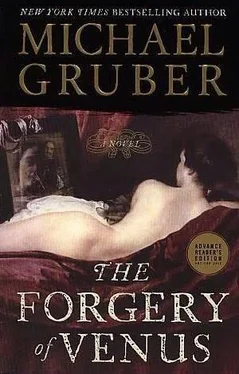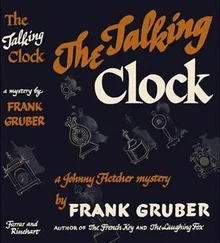When I awakened it was dark, darker than a hospital usually is, and that hospital smell was gone. I rose from my bed and walked out of the room to find myself in a wide hallway, high ceilinged, the walls covered in tapestries, with an occasional large painting. By the dim yellow light from candles set in wall sconces I see there are people there too, guards with helmets and halberds, and men and women dressed in black, with lace collars. None of them pay me any attention. There is a room from which comes the sound of weeping and muttered prayer. I go in and pass through several rooms, all richly furnished and lit with many candles, and at last to a bedroom, and a deathbed. There I see the soon-to-be widow, and the daughter and the son-in-law, and the priests, and those who have come to pay their last respects, and on the high draped bed is the dying man. The air is heavy with the scent of cloves.
I stand at the foot of this bed and stare at the wan, exhausted face, and the man opens his eyes and sees me.
He says, “You! I know you. I’ve dreamed about you in my dreams of hell. Are you a demon?”
“No,” I say, “just a painter like you. And it wasn’t hell you dreamed of, it was the future.”
“Am I dreaming still, then?”
“Perhaps. Perhaps I am dreaming you. No one else here can see me and this is real, at least to you.”
He closes his eyes and shakes his head. “Then go away. I am sick.”
“You are dying, Don Diego. This is your last day on earth.”
“Then why are you tormenting me? Leave me in peace!”
“I had no choice in the matter,” I say. “I took a drug that comes from the Indies and the drug brought me to you. I can’t explain it, even though in the future we are more clever about these things than they were in your time. In any case, here I am, and I would like to ask you a question.”
He opens his eyes, waiting.
I say, “What became of the last portrait you painted of Leonora Fortunati, the one with your own portrait in the mirror?”
“You know about that?” he says, and his sunken eyes grow wide.
“I know everything, Don Diego. I know about you chasing the seller of red carnations when you were a child and how the priest brought you home, and how you learned to paint, and your visit to Madrid, when you were rejected, and how you went another time and became the king’s painter and how you felt when he first touched you, and your conversations with Rubens and your voyages to Italy, the first and the second, and I know about Leonora, how you painted her for Heliche and how she taught you about the art of love.”
It is a while before he speaks again, nor am I sure that he speaks at all. Perhaps it is a more subtle communication. “She died,” he says. “The plague struck in Rome and the boy died and she became sick as well and she wrote to me. She said she burnt it. I burnt her letter.”
I say, “This may be so, but the painting lives again. I’ve seen it with my own eyes.”
“Well, since I am conversing with a phantom, which is impossible, then I suppose that it is also possible that a burnt painting can come back to life. It was a wicked painting, but a good one. What you saw, however, was a forgery. The woman did not lie, I think, not when she saw the marks of death on her body.”
He pauses, perhaps lost for a moment in memory. Then he says, “You said you were a painter-do they paint, then, in your future?”
“Yes, after a fashion. Not as you did.”
“No one painted as I did, even in my own time. Tell me, do the kings of Spain still keep my paintings and admire them?”
“Yes, they do, and so does all the world. In a few years from now Luca Giordano will stand before your portrait of the royal family and call it the theology of painting. A thousand painters have gone to school before it.”
A faint smile forms on the dry lips. “That Neapolitan boy-how we laughed about him!” He lets out a long sigh and says, “And now, Sir Phantom, I must, as you say, be about the business of dying, and I wish to turn my thoughts to God and away from things that happened long ago, that I regret.”
“But it was a wonderful painting.”
“Yes, wonderful,” he says, and perhaps he does not mean the painting, or not entirely.
I say, “Farewell, Velázquez,” and he says, “Go with God, Sir Phantom, if you are not a devil.”
What to make of this, I thought, lying in my madhouse bed, later on that long night. A vivid dream is the easiest explanation, a kind of tying up of the whole thing, now that I’m officially on the mend. But I sniffed the sleeves of my bathrobe and got a whiff of cloves. Or did I imagine that too? Like my little game with Rose. Did I imagine her giving the failed artist Chaz’s address when I asked her in the barn? I felt so bad about frightening her in the hall at Krebs’s house, but only in a vague and distant way, like it had happened long ago to someone else. It was sweet not to have any of it matter under these wonderful drugs.
I slept then, deep and dreamless, and in the morning when I passed my door on the way to the toilet, I happened to look out the little window, and who should I see but Krebs. He was in deep consultation with Dr. Schick and another man, one whose face I knew well, because I’d drawn a portrait of it in Madrid. Dr. Schick seemed to be explaining something to him, and he was nodding. Well, then, as Krebs suggested, he must be some kind of mental health guy. Although he still had the face of a gangster.
About an hour later, after breakfast, Dr. Schick came in and I had a long session with him. I gave him the life story, and how I felt about painting, and especially about the paintings I was doing, the slick nudes, I meant, and why I should imagine myself an impoverished though principled hack, rather than a wealthy and fashionable painter. He had a lot of good things to say about the fragility of the mind, and how it sometimes cracked under the strain of contrary urges and desires. Not at all unusual, he said, even among highly successful people. I told him about the salvinorin, and he wiggled his eyebrows and said, “Well, no wonder!”
I asked him what was in the implant that they removed, and he said they didn’t know. It was empty.
“What could it have been?” I asked.
“I would have to guess there,” he said, “for of course I have no medical records here for you. But people have had good success with such devices for dispensing antipsychotics. You know, many of those suffering from forms of schizophrenia refuse to take their medications, and this is one way to fix that.”
I agreed that this was a possible explanation, and we chatted some more about controlling my symptoms. He gave me a prescription for more calming drugs and also for Haldol, which he thought I’d do well on, almost an ideal Haldol patient, he said.
I must have been, because a few days later I was discharged. I sat out on a bench in the sun outside the hospital. I was trying to recall painting those Wilmot nudes I’d seen, and the events that went with that life, and you know, it started to come back to me. My shows, mingling with the rich and famous, doing the paintings, and bit by bit I assembled memories of that life. It’s amazing what the mind can do. After a while a Mercedes pulled up on the drive with Franco at the wheel, and I got in and he drove me back to the Krebs establishment.
I did wonder why Lotte hadn’t come to see me at the hospital, but I found that she’d left to bring Milo to his Swiss clinic, taking Rose with her. That was fine by me. It’s embarrassing to be crazy, especially the kind of crazy I was, where you’ve forgotten the life you lived with another person. Were we really still married in this life? I hadn’t asked.
A few days passed. Not a bad existence, I had to admit. Responsibilities were few, one never wanted for company, and I had the run of the place except for Krebs’s office. Time just flowed on by. I did not pick up a brush or a pencil after returning from the nuthouse, but I knew I eventually would, maybe as an outsider artist, like those brilliant schizophrenics who cover acres of paper with their obsessions, or maybe I will cleave more closely to the mainstream and turn my craziness into real money, like van Gogh, and Cornell, and Munch. Or go back to the pricey nudes.
Читать дальше












